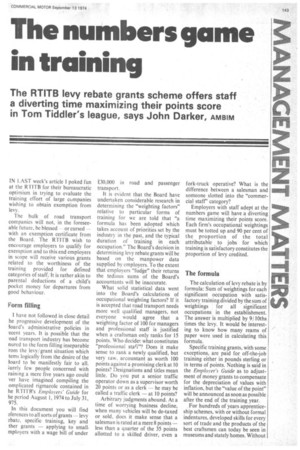Form filling
Page 153

If you've noticed an error in this article please click here to report it so we can fix it.
I have not followed in close detail he progressive development of the 3oard's administrative policies in .ecent years. It is possible that the .oad transport industry has become nured to the form filling inseparable rom the levy/grant situation which • tems logically from the desire Of the 3oard to be manifestly fair to all. ;urely few people concerned with raining a mere five years ago could ver have imagined compiling the omplicated rigmarole contained in he RTITB's Employers' Guide for he period August 1, 1974 to July 31, 975.
In this document you will find eferences to all sorts of grants — levy ebate, specific training, key and ther grants — applying to small, mployers with a wage bill of under £30,000 in road and passenger transport.
It is evident that the Board have undertaken considerable research in determining the "weighting factors" relative to particular forms of training for we are told that "a formula has been adopted which takes account of priorities set by the industry in the past, and the typical duration of training in each occupation." The Board's decision in determining levy rebate grants will be based on the manpower data supplied by employers. To the extent that employers "fudge" their returns the tedious sums of the Board's accountants will be inaccurate.
What solid statistical data went into the Board's calculations of occupational weighting factors? If it is accepted that road transport needs more well qualified managers, not everyone would agree that a weighting factor of 100 for managers and professional staff is justified when a craftsman only ranks for 15 points. Who decidef, what constitutes "professional star? Does it make sense to rank a newly qualified, but very taw, accountant as worth 100 points against a promising clerk at 10 points? Designations and titles mean little. Do you put a senior traffic operator down as a supervisor worth 20 points or as a clerk — he may be called a traffic clerk — at 10 points?
Arbitrary judgments abound. At a time of worrying business decline, when many vehicles will be de-taxed or sold, does it make sense that a salesman is rated at a mere 8 points — less than a quarter of the 35 points allotted to a skilled driver, even a fork-truck operative? What is the difference between a salesman and someone slotted into the "commercial staff' category?
Employers with staff adept at the numbers game will have a diverting time maximizing their points score. Each firm's occupational weightings must be totted up and 90 per cent of the proportion of the total attributable to jobs for which training is satisfactory constitutes the proportion of levy credited.




























































































































































































































